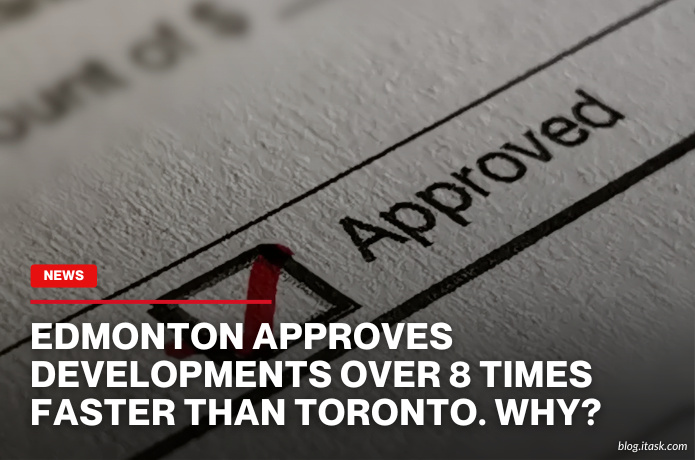Edmonton Approves Developments Over 8 Times Faster Than Toronto. Why?
Edmonton Approves Developments Over 8 Times Faster Than Toronto. Why?

Edmonton is approving housing developments over eight times faster than Toronto, according to a recent study by the Canadian Home Builders' Association (CHBA). The 2022 Municipal Benchmarking Study evaluated 23 Canadian cities on factors like permit approval timelines, municipal fees, and planning processes. Edmonton ranked first overall, while Toronto placed 21st, highlighting a significant disparity in development efficiency.
One key factor in Edmonton's efficiency is its adoption of an automated review system for development permits. This system allows applicants to receive same-day approvals for building single-detached or semi-detached homes in designated areas. By streamlining the permit process, Edmonton has reduced approval times from an average of two weeks to just one day, saving applicants an estimated $5.3 million and 67,600 days annually.
In contrast, Toronto's development approval process is hindered by outdated planning frameworks and lengthy timelines. The CHBA study found that Toronto's average approval time for development proposals is approximately 25 months, compared to Edmonton's three months. These delays contribute to higher carrying costs for builders, which are ultimately passed on to homebuyers, exacerbating housing affordability issues in the city.
Edmonton's commitment to simplifying its planning framework has also played a significant role in expediting development approvals. The city consolidated around 200 outdated district plans into just 15 updated plans, aligning them with the new City Plan. This overhaul has provided clearer guidelines for developers and reduced bureaucratic hurdles, facilitating a more efficient approval process.
The federal government's Housing Accelerator Fund has recognized Edmonton's efforts by awarding the city $17.5 million in bonus funding for meeting housing supply goals and improving approval timelines. Toronto, however, did not qualify for this funding, missing out on potential millions that could have supported its housing initiatives.
As Canada's housing crisis continues, Edmonton's proactive approach to streamlining development approvals serves as a model for other municipalities. By embracing automation and overhauling outdated planning processes, Edmonton is addressing housing supply challenges head-on, while cities like Toronto may need to reevaluate their systems to keep pace.
